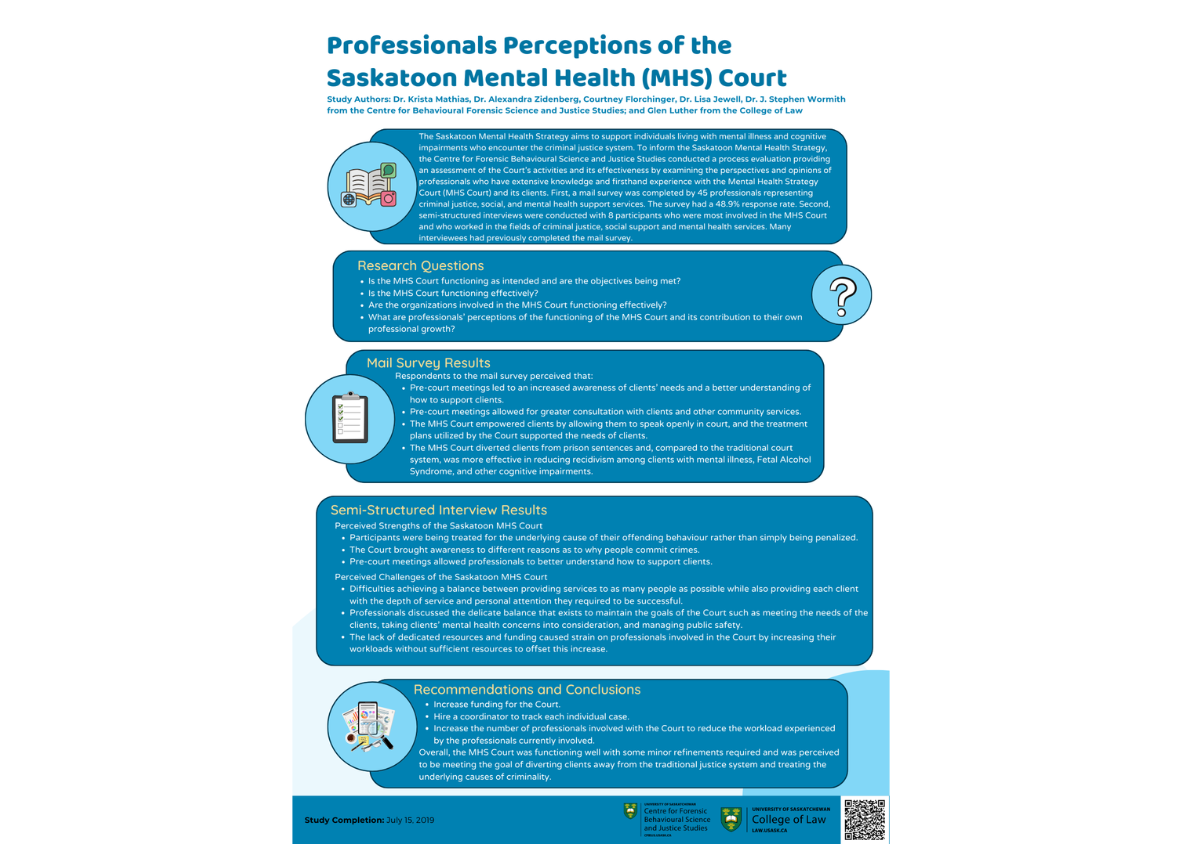
Professionals’ Perceptions of the Saskatoon Mental Health Strategy (MHS) Court
The purpose of this evaluation is to provide The Steering Committee of the Saskatoon Mental Health Strategy with a process evaluation exploring the activities implemented by the MHS Court program. This research was conducted to provide a comprehensive assessment of the MHS Court’s activities and effectiveness by examining the perspectives and opinions of professionals who have extensive knowledge and firsthand experience with the MHS Court and its clients.
By Krista Mathias, Alexandra Zidenberg, Courtney Florchinger, Brad Smith, Lisa M. Jewell, J. Stephen Wormith and Glen LutherThe Saskatoon Mental Health Strategy (MHS) aims to improve support and supervision for individuals suffering from mental illness and cognitive impairments coming into contact with the criminal justice system (Barron, Moore, Luther & Wormith, 2015). Specifically, the Saskatoon MHS brings together a variety of community stakeholders and legal professionals to improve support and provide legal and medical assistance to persons with mental illness in contact with the criminal justice system. As mental health courts typically rely on a collaborative team of dedicated professionals, services and advocacy groups who perform a variety of roles within the court, these professionals offer exclusive insight into the MHS Court’s functioning and overall success. Indeed, ensuring the involvement of individuals with a broad range of knowledge and experiences in creating and evaluating mental health court services is important, as it can provide a deeper understanding of their effectiveness (Stockdale Winder, 2014).
This report is guided by the following evaluation questions:
- Is the MHS Court functioning as intended and are the objectives of the MHS Court being met?
- Is the MHS Court functioning effectively? What are its strengths, weaknesses, barriers, and gaps?
- Are the organizations involved in the MHS Court collaborating effectively? Are some being utilized more than others?
- What are professionals’ perceptions of the functioning of the MHS Court and its contribution to their own professional growth?
Methods
A mail survey was administered to a variety of professionals with either direct or indirect involvement with the MHS Court and/or its clients. The survey asked participants about general perceptions of mental health courts, their experience with the Saskatoon MHS Court, the effectiveness of specific court components, and their perceptions of client outcomes.
Follow-up interviews were conducted on a purposeful sample of eight professionals involved in the Saskatoon MHS Court. These interviews were intended to provide a more in-depth understanding of professionals’ perceptions of the Saskatoon MHS Court. Specifically, they explored professionals’ perspectives on how the MHS Court is functioning, its benefits to clients and perceived client outcomes, barriers and gaps in the MHS Court, systemic issues faced by the Court, and areas where improvements are required.
Conclusion
Overall, the MHS seems to be functioning effectively although there are several areas where improvements could occur. As part of a multi-phase evaluation, future components of the evaluation will provide a more in-depth understanding of the MHS Court and the impact it is having on clients. For instance, follow up interviews with clients and family members will serve to expand on the results of the current study. Specifically, this would allow further investigation into the impact the MHS Court has had on client outcomes from the perspectives of clients themselves. Moreover, a pre-post analysis of health, police and court data will provide a greater understanding of the MHS Courts effectiveness and overall client outcomes as a result of their involvement in the MHS Court.

